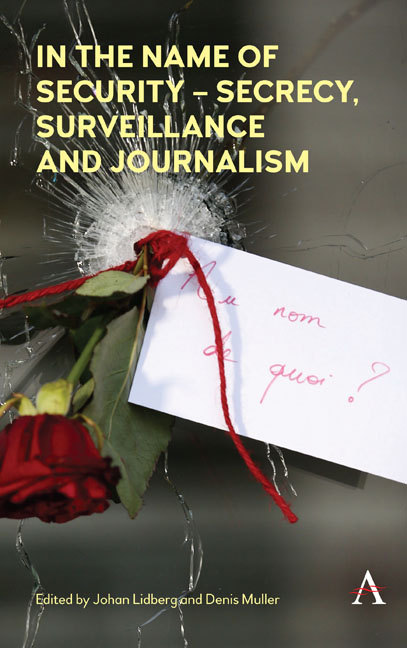Book contents
- Frontmatter
- Contents
- List of Tables
- Introduction
- Chapter 1 The Public Privacy Conundrum – Anonymity and the Law in an Era of Mass Surveillance
- Chapter 2 Undesirable Types – The Surveillance of Journalists
- Chapter 3 Surveillance and National Security ‘Hyper- Legislation’ – Calibrating Restraints on Rights with a Freedom of Expression Threshold
- Chapter 4 The Ethics of Reporting National Security Matters
- Chapter 5 When One Person's Noble Whistleblower Becomes Another's Poisonous Leaker
- Chapter 6 Who Watches the Watchmen? Access to Information, Accountability and Government Secrecy
- Chapter 7 Eyes and Ears in the Sky – Drones and Mass Surveillance
- Chapter 8 Looking over My Shoulder – Public Perceptions of Surveillance
- Chapter 9 Journalism and National Security in Three BISA Countries – Brazil, India and South Africa
- Chapter 10 Journalism and National Security in the European Union
- Chapter 11 The Security Reporter Today – Journalists and Journalism in an Age of Surveillance
- Conclusion: Journalism and the State of Exception
- Contributors
- Index
Chapter 3 - Surveillance and National Security ‘Hyper- Legislation’ – Calibrating Restraints on Rights with a Freedom of Expression Threshold
Published online by Cambridge University Press: 21 June 2018
- Frontmatter
- Contents
- List of Tables
- Introduction
- Chapter 1 The Public Privacy Conundrum – Anonymity and the Law in an Era of Mass Surveillance
- Chapter 2 Undesirable Types – The Surveillance of Journalists
- Chapter 3 Surveillance and National Security ‘Hyper- Legislation’ – Calibrating Restraints on Rights with a Freedom of Expression Threshold
- Chapter 4 The Ethics of Reporting National Security Matters
- Chapter 5 When One Person's Noble Whistleblower Becomes Another's Poisonous Leaker
- Chapter 6 Who Watches the Watchmen? Access to Information, Accountability and Government Secrecy
- Chapter 7 Eyes and Ears in the Sky – Drones and Mass Surveillance
- Chapter 8 Looking over My Shoulder – Public Perceptions of Surveillance
- Chapter 9 Journalism and National Security in Three BISA Countries – Brazil, India and South Africa
- Chapter 10 Journalism and National Security in the European Union
- Chapter 11 The Security Reporter Today – Journalists and Journalism in an Age of Surveillance
- Conclusion: Journalism and the State of Exception
- Contributors
- Index
Summary
Introduction
The post-11 September 2001, era has unleashed a plethora of laws invoking national security and antiterrorism justifications that have severely compromised a range of human rights and civil liberties, including freedoms associated with expression and information access. Roach has described such laws as ‘hyper- legislation’ (2011, 310). Such legislation has inflicted oftenunjustified constraints upon journalists and journalism. The overly broad antiterrorism laws potentially ensnare reporters covering security matters and have inflicted repeated blows on investigative journalism in recent times (Weisbrot 2016). Insufficient attention, however, is paid to the potential for these constraints to be informed and moderated by the constitutional and human rights frameworks in which such laws are enacted. There has been inadequate resolve to protect the public interest by ensuring that journalists and journalism are able to properly perform their professional duties and obligations. This chapter uses archival research, analysis of statutes and case law to examine how freedom of expression constitutional and human rights provisions in the Five Eyes democracies have, in reality, offered minimal protection to journalists and their sources – particularly in Australia, where a constitutional protection for freedom of expression is lacking. The absence of strong protections or the rampant undermining of existing protections, in the face of what Agamben (2005, 1) describes as an ongoing ‘state of exception’ in the post– 9/11 war on terror, presents the need for new mechanisms to provide journalists and their confidential sources adequate protection to enable them to fulfil their professional obligations.
The authors argue that the long- held importance of freedom of expression in democracies supports the introduction of workable and explicit public interest defences to allow for the reporting of national security matters without endangering journalists or the sanctity of their obligations to confidential sources. The chapter undertakes a case study of Australia which, unlike the other Five Eyes intelligence alliance members – New Zealand, Canada, the United Kingdom and the United States – has no explicit constitutional or human rights framework to compel the courts or the Parliament to recognize the adverse implications of legislation upon free expression or a free media.
- Type
- Chapter
- Information
- Publisher: Anthem PressPrint publication year: 2018



